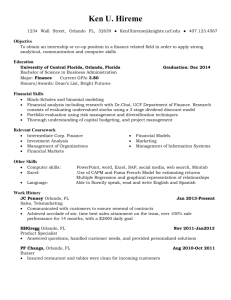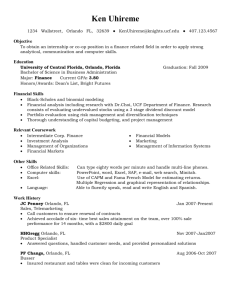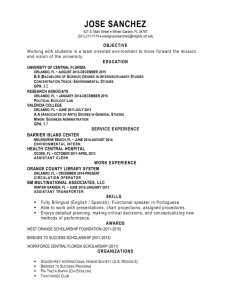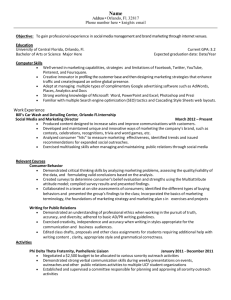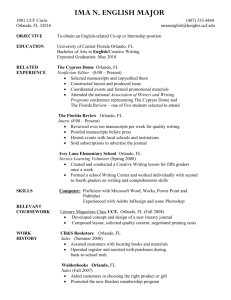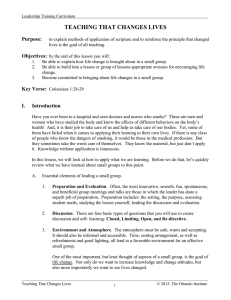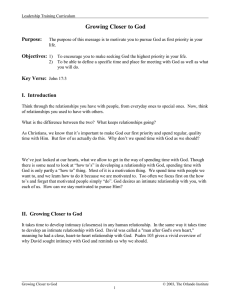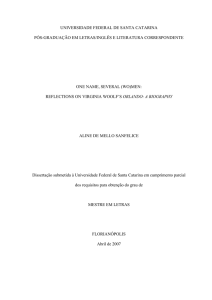MANAGING YOURSELF Purpose: Objectives:
advertisement
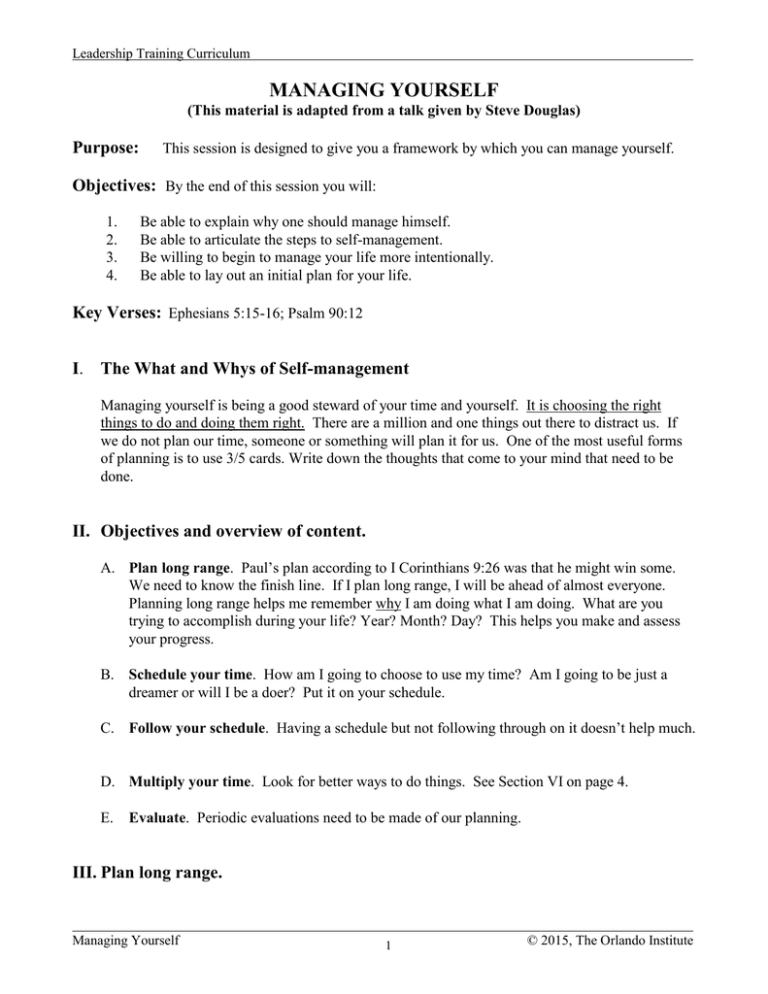
Leadership Training Curriculum MANAGING YOURSELF (This material is adapted from a talk given by Steve Douglas) Purpose: This session is designed to give you a framework by which you can manage yourself. Objectives: By the end of this session you will: 1. 2. 3. 4. Be able to explain why one should manage himself. Be able to articulate the steps to self-management. Be willing to begin to manage your life more intentionally. Be able to lay out an initial plan for your life. Key Verses: Ephesians 5:15-16; Psalm 90:12 I. The What and Whys of Self-management Managing yourself is being a good steward of your time and yourself. It is choosing the right things to do and doing them right. There are a million and one things out there to distract us. If we do not plan our time, someone or something will plan it for us. One of the most useful forms of planning is to use 3/5 cards. Write down the thoughts that come to your mind that need to be done. II. Objectives and overview of content. A. Plan long range. Paul’s plan according to I Corinthians 9:26 was that he might win some. We need to know the finish line. If I plan long range, I will be ahead of almost everyone. Planning long range helps me remember why I am doing what I am doing. What are you trying to accomplish during your life? Year? Month? Day? This helps you make and assess your progress. B. Schedule your time. How am I going to choose to use my time? Am I going to be just a dreamer or will I be a doer? Put it on your schedule. C. Follow your schedule. Having a schedule but not following through on it doesn’t help much. D. Multiply your time. Look for better ways to do things. See Section VI on page 4. E. Evaluate. Periodic evaluations need to be made of our planning. III. Plan long range. Managing Yourself 1 © 2015, The Orlando Institute Leadership Training Curriculum A. Why plan? It helps us know what is important to do and what is not so important. The Bible gives a good example of what happens when we do not plan long range. Read Luke 14:2830. B. How to plan. 1. Pray. James 1:5 2. Establish objectives. This is the “what” step. Objectives are long-range aspirations. They answer questions like, “What do I want to accomplish in the next (time period), and, “How will I know when I’ve reached it?”. 3. Program. This is the how step. How do I fulfill the objectives that I made? What do I need to do in what order to reach my objectives? 4. Schedule. This is the when step. When does each step of the program need to be completed. It needs to be put into your schedule and done. 5. Budget. This is the how much or how supplied step. It deals with the resources I will need to reach the objective. It will include money, people, materials, education, etc. This is not only money. C. Application. 1. Your life objectives. According to Psalm 96:1-6, John 17:4 & Rev. 4:8-11 we are given a life objective of glorifying God. We are told how to glorify God in John 15:8 by bearing much fruit. In life, what have you been called to do? In your life, how have you been called to glorify God? Let’s all leave a legacy of men and women who will be multiplying disciples. 2. Overview of life program and schedule. There are various stages in life. Some of us are in the apprentice stage while others are in the mastery stage. This will determine much of what we will do. Are we in the teaching stage or the learning stage? 3. Your objectives for the next five years. We need to improve at setting ministry and personal goals and then following through. 4. Your objectives for the next 6-12 months. 5. Program your budget for the priority objectives for the next 6-12 months. IV. Schedule your time. A. Why schedule your time? Some people do and some don’t. Why don’t we? Managing Yourself 2 © 2015, The Orlando Institute Leadership Training Curriculum B. How to schedule your time. It is very important to have a specific time each week when you plan, preferably at the beginning of the week or before the week begins. 1. List activities. Make out a “to-do” list. 2. Ask if tasks are assignable. This might not apply to everyone. This can’t be done randomly. 3. Assess priorities. Prioritize your list. What is really important in your life? I Thessalonians 5:21 & Ephesians 5:15-16 tell us to evaluate our time and do the best things. Since some things just have to be done, this is not always possible, but attempt to do so. As you start with the list, do #1 priority until finished. 4. Schedule. What is the best time to do certain things? For example, just after lunch is usually not a good time to do projects that need a lot of thinking if you are usually sleepy at that time. C. Application. 1. Example of scheduling a 2-hour period of time. For example: What will you do between 7:30 and 9:30 this evening? Make out a list and prioritize. You could watch TV, read a book, clean room, study the Bible, pray, wash dishes or pull weeds. Prioritize and do this evening. 2. Scheduling your next available 2-3 hour period of time. Do daily, weekly and monthly schedules. Schedule a time to do it. V. Follow your schedule. A. Motivation. Learn to like what you need to do. 1. Ask God to give you a liking to do something. 2. Remember why you do what you do. 3. Enlist the help of a friend. 4. Make a game of it. B. Discipline. Self-control is the fruit of the Spirit. Live it out in your experience by faith. 1. Get a prayer partner to pray with you and for you. 2 Schedule a meeting to discuss it. That will motivate you to prepare. 3. Get started. Just do it! C. Sensitivity. Be sensitive to God and others in your planning. Don’t get so involved in your plan that you forget to listen to God or you run over people. Managing Yourself 3 © 2015, The Orlando Institute Leadership Training Curriculum D. Peace. Remember that God can give you peace in all situations. Trust Him. E. Application. You have been given a couple of assignments to help get you started. Some of you may already be good at planning, but others may feel intimidated with the thought of doing all this planning. For those who have never really planned, this can be something that can free you up instead of making you a slave. You will be surprised at how much you can accomplish. God bless you as you begin the adventure of trusting God in this very important area of your life. VI. HOW TO MULTIPLY YOUR TIME A. Learn to say “no.” B. Typical time wasters: Television, this can be the greatest time waster of them all. We need to be aggressive in not watching much TV. It is a neutralizer of the mind. C. Travel: Keep a schedule. Make use of travel time (for example – while sitting on a jet flight). How else can we do so? D. Thinking/Studying: We need to find the place where we study the best. We also need to know when we study best. Most people do not study well after lunch. Do you study best sitting at a desk or in another position? Some people like to stand while studying. It keeps them alert. E. Pace: Every once in awhile we need a short break from studying or reading. Watch that they don’t become extended times. F. Appointments: Know what needs to be accomplished. Keep on the subject. Know what to do if the appointment does not show up. G. Meetings: Plan before hand. An organized plan helps everyone to keep on track. You can finish the meeting sooner that way also. Determine needs for improvement in various areas of your life. Then make a plan to improve in those areas. Work together with your mentor in these areas. Discussion Questions: 1. Why should we manage ourselves? 2. What are the steps to self-management? 3. How will you use this information to begin to manage your life more intentionally? Managing Yourself 4 © 2015, The Orlando Institute Leadership Training Curriculum 4. What kind of initial plan will you lay out for your life as a result of this talk? Managing Yourself 5 © 2015, The Orlando Institute Leadership Training Curriculum SCHEDULE FOR WEEK OF: Monday Tuesday Wednesday Thursday Friday Saturday Sunday 6 - 7 am 7 - 8 am 8 - 9 am 9 - 10 am 10 - 11 am 11 am - Noon Noon - 1 pm 1 - 2 pm 2 - 3 pm 3 - 4 pm 4 - 5 pm 5 - 6 pm 6 - 7 pm 7 - 8 pm 8 - 9 pm 9 - 10 pm 10 - 11 pm 11 pm midnight Additional Things To Do Managing Yourself 6 © 2003, The Orlando Institute

